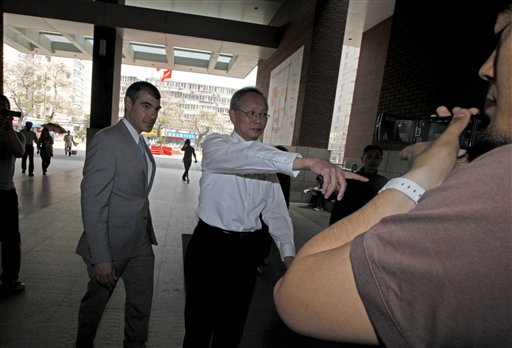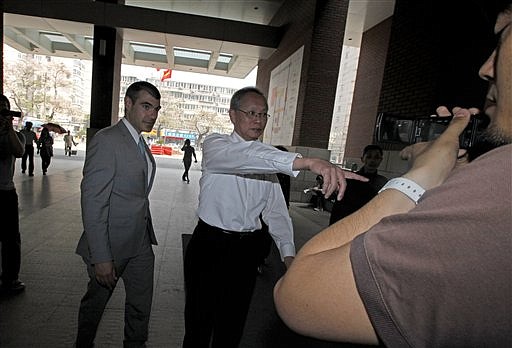 Robert S. Wang, center, deputy chief of mission at the U.S. embassy in Beijing, gestures as he walks with an unidentified U.S. embassy staff, left, outside the hospital where blind activist lawyer Chen Guangcheng is recuperating in Beijing today. The Chinese activist at the center of a diplomatic standoff between the United States and China said Friday his situation is "dangerous," and that American officials have been blocked from seeing him for two days and friends who have tried to visit have been beaten up. (AP Photo/Ng Han Guan)
Robert S. Wang, center, deputy chief of mission at the U.S. embassy in Beijing, gestures as he walks with an unidentified U.S. embassy staff, left, outside the hospital where blind activist lawyer Chen Guangcheng is recuperating in Beijing today. The Chinese activist at the center of a diplomatic standoff between the United States and China said Friday his situation is "dangerous," and that American officials have been blocked from seeing him for two days and friends who have tried to visit have been beaten up. (AP Photo/Ng Han Guan)GILLIAN WONG and MATTHEW LEE
BEIJING (AP) - China hinted at a possible, face-saving way out of a diplomatic standoff with the United States over legal activist Chen Guangcheng, saying Friday that he could apply for permission to study abroad.
The concession was offered in a Chinese Foreign Ministry statement while Chen remained in a guarded Beijing hospital ward, unable to see U.S. officials. His wife's movements are being monitored, he said, and the couple with their two children feel in danger.
"I can only tell you one thing. My situation right now is very dangerous," Chen said. "For two days, American officials who have wanted to come and see me have not been allowed in."
A blind, self-taught lawyer and symbol in China's civil rights movement, Chen embroiled Washington and Beijing in their most delicate diplomatic crisis in years after he escaped house arrest and sought refuge in the U.S. Embassy last week. He left six days later under a negotiated deal in which he and his family were to be safely relocated in China so he can formally study law. But he then upended the agreement by saying they wanted to go abroad.
Since his release to a Beijing hospital where he was reunited with his wife, son and daughter, Chen's conversations with The Associated Press, other foreign media and friends have resonated around the world, and even become part of Washington politics in a presidential election year.
On Thursday, he called in to a congressional hearing in Washington, telling lawmakers he wanted to meet U.S. Secretary of State Clinton, who is in Beijing for annual security talks.
"I hope I can get more help from her," Chen said.
While publicly Washington has said little and Beijing has shown little inclination to budge, contacts have taken place. Clinton met Chinese President Hu Jintao and other top leaders, though officials declined to say if Chen's case was discussed. The Foreign Ministry statement was among the first signs of progress. In it, a spokesman said Chen as a normal citizen may apply to study overseas.
"Chen Guangcheng is currently being treated in hospital. As a Chinese citizen, if he wants to study abroad he can go through the normal channels to the relevant departments and complete the formalities in accordance with the law like other Chinese citizens," the statement said without elaborating.
While the statement only reiterates the normal rights of a Chinese citizen, it underscored the government's openness to letting him go and gives shape to a possible solution: He goes abroad with the approval of the Chinese government, not the U.S., giving Beijing a face-saving way out.
Chen has a letter of invitation from New York University, according to Guo Yushan, a supporter who helped hide Chen in Beijing after his escape from house arrest, in a Twitter post early Friday.
At a Foreign Ministry briefing, spokesman Liu Weimin also confirmed that Chen faces no pending criminal charges, indirectly acknowledging that the house arrest he and his family endured the past 20 months in their rural home was the retribution of local officials for Chen's activism. Chen has exposed forced abortions and other abuses in his community as part of China's population controls.
"According to Chinese laws, he is a regular citizen. He can absolutely go through regular formalities by normal means," Liu said.
Obstacles remain. It isn't clear if Chen would have to return to his home province of Shandong to receive a passport, as is normal, and the statements do not mention his family. His wife was stopped in 2007 from traveling to the Philippines to pick up a humanitarian award for Chen while he was in prison.
U.S. diplomats were unable to meet Chen personally for a second day Friday, able to talk only by telephone. U.S. Embassy deputy chief of mission Robert Wang entered the grounds of Chaoyang Hospital carrying food and later meeting Chen's wife, Yuan Weijing.
Chen, in his remarks to the AP, said his phone calls to American officials "keep getting cut off after two sentences." His wife, when she is allowed out of the hospital, has been followed by unidentified men who video-record her, he said. And friends and supporters were beaten up trying to visit him Thursday.
Jiang Tianyong's beating by state security agents caused him hearing loss in one ear, Jiang's wife said Friday. Du Yanlin said he was stopped from entering the hospital and when he turned to speak to foreign reporters gathered outside, police grabbed him. His friend, Liu Yi, tried to intervene but said plainclothes police dragged him to a nearby courtyard and beat him around the head 10 times with a plastic water bottle before driving him to a police station for questioning.
China's well-controlled state media, in some of their first comments on the case, heaped scorn on Washington and U.S. Ambassador Gary Locke, criticizing them for using Chen to demonize China and impose U.S. values.
"The fact that the U.S. brought up the issue of Chen Guangcheng does not mean that the U.S. really has any good will, but that it is full of desires to put on a show," said the Beijing Times. "They look like they are thrilled about finding a tool and a chess piece for messing things up for China."
But the U.S. involvement in Chen's case - first by taking him in and then by letting him go - has hardly been cause for celebration in Washington. It has exposed President Barack Obama to criticism in what is expected to be a closely fought re-election campaign. Mitt Romney, the presumptive Republican challenger, savaged the White House on Thursday for putting Chen at risk.
"If these reports are true, this is a dark day for freedom and it's a day of shame for the Obama administration," Romney said, campaigning in Virginia.
Politics is also playing into Beijing's handling of the case. Hu and others in the Communist Party leadership are stepping aside later this year for a younger generation of leaders, and while the seats are shifting, uncompromising views on dissent and on American interference are usually safe lines of attack.
At the end of the two-day strategic discussions, Clinton said that respecting human rights featured in the talks and she made glancing reference to Chen's case.
"This week has shown again that we cannot wall off human rights from our bilateral relationship or relegate it to the margins of our engagement," she said in a statement. "It has also shown that advancing the cause of human rights in China depends to a large degree on that engagement and on developing a productive and resilient relationship."
